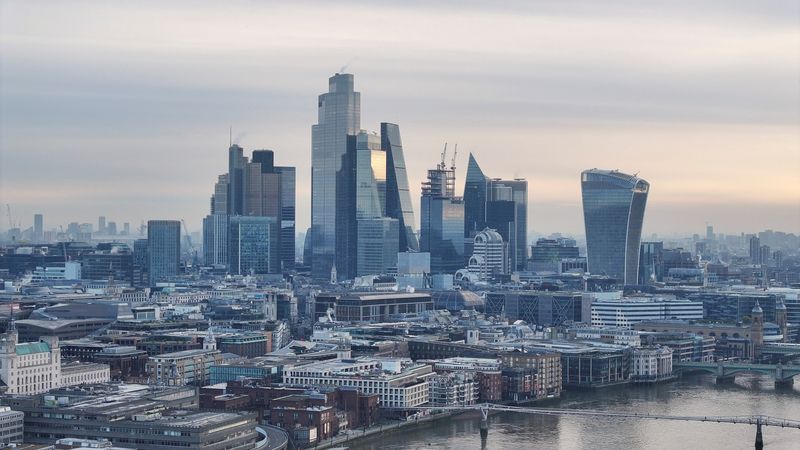By William Schomberg
LONDON (Reuters) - The winners of Britain's election on July 4 will have to tackle an economy that looks stuck in a rut of slow growth with high levels of debt limiting the next government's ability to spark a significant recovery.
After the blow dealt by the global financial crisis of 2007-09, the world's sixth-biggest economy has been buffeted by the 2016 decision to leave the European Union, the COVID pandemic and a surge in energy and food prices in 2022.
Britain's economic performance since the coronavirus crisis has been the weakest among the Group of Seven economies with the exception of Germany, which was also hit hard by the jump in energy prices following Russia's invasion of Ukraine.
And the country's inability to keep up with its peers in terms of productivity growth has contributed to a gap in living standards compared with other European countries.
Middle-income people in Britain are 20% poorer than their peers in Germany and 9% poorer than those in France, according to research by the Resolution Foundation, the Centre for Economic Performance and the Nuffield Foundation.
Prime Minister Rishi Sunak, who is struggling to turn around a huge opinion poll deficit, has sought to lift the mood of voters by saying the economy is turning a corner after a short, shallow recession in the second half of last year.
In his speech to announce the election, Sunak pointed to a fall in inflation to almost 2% in data published earlier on Wednesday - down from a peak above 11% in 2022 - as proof that his plans were working.
"Economic stability was only ever meant to be the beginning," he said. "The question now is how and who do you trust to turn that foundation into a secure future for you, your family and our country."
Gross domestic product grew strongly in the first quarter of 2024 and the fall in inflation has raised the prospect of the first Bank of England interest rate cuts since 2020.
But the recovery looks likely to be halting. The International Monetary Fund this week predicted growth of 0.7% in 2024 and 1.5% in 2025, well below its 2.75% average before the global financial crisis.
LOW INVESTMENT, HIGH DEBT
The main opposition Labour Party, riding high in the polls, blames Sunak's Conservatives for what looks set to be the first fall in living standards between one national election and the next since at least the 1950s.
Labour leader Keir Starmer claims he will turn Britain into the fastest-growing Group of Seven economy by attracting private investment that he says has been held back by the political upheaval since the Brexit vote under the Conservatives.
In 2022, British business investment was below its level in 2016, a contrast with other G7 economies that experienced a 14% average increase during the period.
For all the upbeat talk of both party leaders, whoever occupies 10 Downing Street after the election will face major impediments to getting the economy on a stronger growth path.
Public debt levels are their highest since the 1960s when the public finances were still under strain from the costs of World War Two.
That limits the ability of the Conservatives to follow through on talk of further tax cuts by Sunak or Labour's hopes of borrowing to fund big investments in the green economy.
Both parties have committed to a fiscal target of getting public debt falling as a share of gross domestic product at the end of a rolling five-year period, a goal that the government is barely on course to meet at the moment.
The IMF was blunt in its assessment of how Britain should meet the challenge of fixing the public finances and getting the economy growing again: higher taxes and politically sensitive reforms to relax restrictions that have thwarted the construction of homes and new infrastructure.
"Right now, too many businesses and households still face rising costs which delay investment decisions and dampen consumer spending," Rain Newton Smith, head of the Confederation of British Industry, said.
Britain's next government must also find a way to tackle deep problems in its labour market.
The country is the only one in the G7 where the share of working-age people outside the workforce remains higher than before the pandemic, which contributes to the slow pace of economic growth and puts pressure on inflation.
Rob Wood, chief UK economist at consultancy Pantheon Macroeconomics, said Labour's plans would provide a modest boost to growth, raising Britain's economic speed limit to 1.75% a year from 1.5%.

"The most sure-fire way of boosting UK productivity and potential growth would be a major improvement in the UK-EU trading relationship," Wood said in a note to clients.
But Starmer has ruled out a major shift to rejoin the EU's single market or a customs union, "which means only small improvements in trading relations with the EU are possible," Wood said.